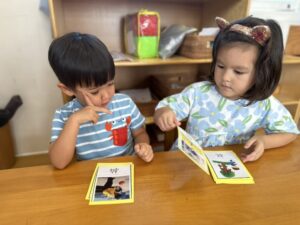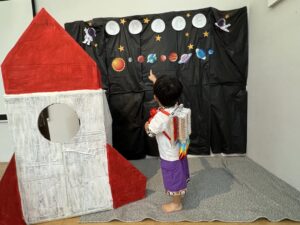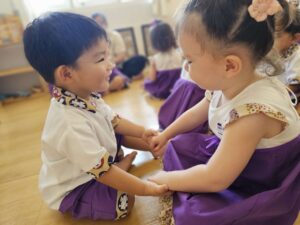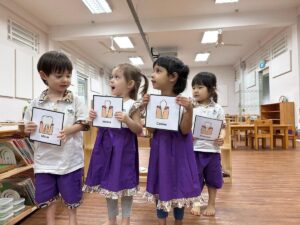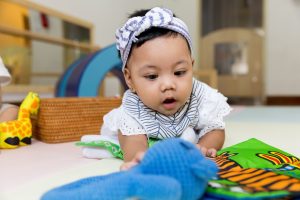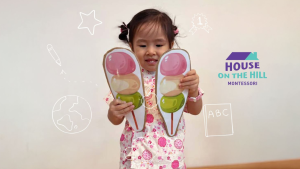Looking to enrol your child in an early childhood education but don’t know where to begin? You are not alone!
We know there are many considerations for parents when working out preschool arrangements – from location, fees, and hours to learning programmes, extra-curricular options, and much more. On top of that, there’s also an understandable mix of emotions. Feeling excited, anxious, or overwhelmed is completely natural as you navigate this important decision for your child’s future.
Another concern parents have is whether the Montessori method is better than traditional education. As you read on, we will examine both sides to help you determine which one is best for your child.
Dr. Maria Montessori wrote, “The most important period of life is not the age of university studies, but the first one, the period of birth to the age of six.”
We’re here to help you understand the advantages of a Montessori education from traditional learning. Creating this path for your child’s future is the first step in preparing them to achieve their fullest potential.
The Montessori Method combines a holistic educational approach with an environment tailored to foster every aspect of a child’s development.
- Purposefully designed classrooms are organised to inspire curiosity and facilitate self-directed learning, featuring a variety of materials that cater to different learning styles and developmental stages.
- Mixed-age classrooms enhance their learning by allowing younger children to learn from older peers but also promotes social skills and leadership among older students.
- A holistic approach to learning ensures each child not only advances academically but also thrives emotionally and socially within a supportive community.
Let’s delve into the comparison between the Montessori method and traditional education to help you make an informed decision.
1. The Teacher’s Role
Teachers in the Montessori method serve as guides and closely observe each child’s interests and progress. This way, each student is provided with individually tailored support and guidance, which promotes independence and critical thinking.
In traditional education, teachers take on a more authoritative role. They follow a standard curriculum, deliver lessons to a whole class, and assess students’ progress through tests and assignments.
2. Active vs. Passive Learning
The Montessori method strongly emphasises hands-on experiential activities, where students learn actively through curated range of options that promote sensory exploration, fine motor skills and conceptual understanding. Each day is different and goes beyond the classroom, which makes lessons fun and memorable.
In traditional classrooms, teachers rely more on lectures, worksheets, and memorisation.
3. Prioritising the Joy of Learning
There’s a clear distinction between how traditional schools and Montessori schools approach motivation.
Traditional schools tend to motivate students with rewards or incentives for good work, like gold stars or a grade of A+, as a tangible validation for achievement.
The Montessori method emphasises intrinsic motivation and the joy of learning. By providing a play-based environment with a curated range of activities, Montessori education encourages children to explore their interests, follow their curiosity, and engage in self-directed learning.
Rather than relying on external rewards, Montessori educators cultivate a sense of intrinsic satisfaction and fulfilment in the learning process itself.
4. Self-Paced vs. Same Pace for All
In Montessori classrooms, students have the freedom to work at their own pace. This individualised approach allows children to progress through the curriculum based on their unique abilities, interests, and readiness.
Teachers in Montessori environments observe each child’s progress closely and provide guidance and support as needed, ensuring that each student receives personalised attention and instruction. This fosters a sense of ownership and accountability as children take responsibility for their learning and progress.
Traditional classes often operate on a fixed timetable with predetermined schedules and deadlines for each subject. All students are expected to progress through the curriculum at the same pace, regardless of their individual learning needs or readiness.
While this approach can provide structure and consistency, it may not accommodate the diverse learning styles and abilities of students. Some children may feel pressured or left behind if they struggle to keep up with the pace set by the class.
5. The Great Debate: Holistic Development vs. Academics-centred Approach
The Montessori education focuses on a holistic approach that nurtures not only academic skills but also social, emotional, and physical development. Montessori classrooms are designed to support the whole child, providing opportunities for exploration, self-discovery, and meaningful engagement in a supportive and nurturing environment.
Teachers in Montessori settings pay close attention to each child’s social and emotional needs, fostering a sense of community, empathy, and respect for others. Additionally, activities and materials are carefully selected to promote physical development and well-being, encouraging movement, coordination, and sensory exploration.
Traditional schools often prioritise academic excellence within an organised and structured learning environment. They may also focus primarily on academic outcomes, sometimes at the expense of other aspects of development.
To attest to the success rate of Montessori-schooled students compared to those who went to traditional schools, a Campbell Collaboration research yielding 2,000 studies from 1970 to 2020 with study participants spread across age levels: preschool, elementary school, middle and high school in eight countries shows Montessori students had better academic benefits, especially in language and maths.
In non-academic measures, Montessori students also excelled; they demonstrated stronger executive function, including self-control, memory and reported an overall positive school experience than traditional students.
We’ve now shared valuable information in your search for the right preschool, you can explore which mode of learning would be best for your child’s personality and prepare them for challenges ahead. This significant first step in your child’s education is in your hands.
But we also know it’s worth spending the time finding the right preschool for you and your child. Montessori education teaches responsibility, initiative, independence, leadership and self-discipline, strong academics, and a lifetime love of learning.
It’s time to set up your child for success. Nurture your child’s love for learning and choose the Montessori method with House on the Hill. Your child’s promising future awaits.
There is a treasure trove of information about the Montessori advantage to help guide you even more. Explore our website to learn more.
For questions or queries about our Montessori classes, schedule a visit now!

